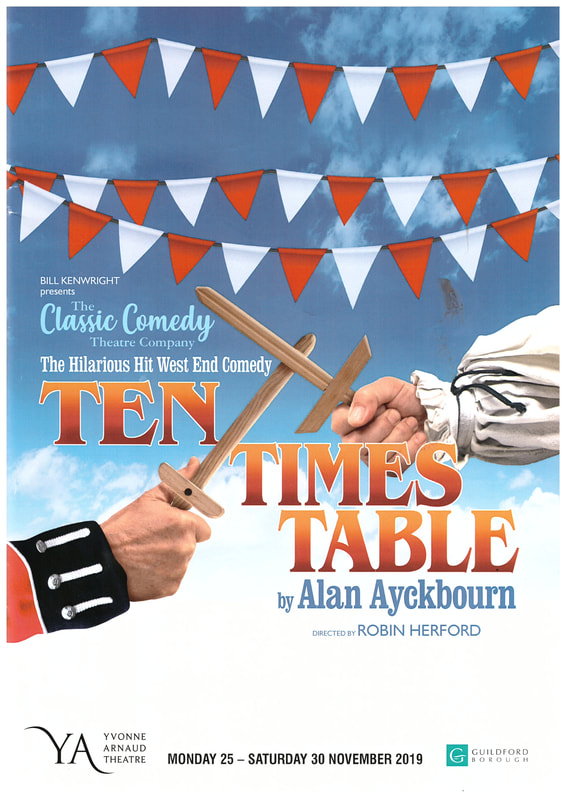|
“Ten Times Table” by Alan Ayckbourn
Yvonne Arnaud Theatre 3 stars I laughed a lot! This ‘romp’ takes a side-swipe at extremes of class and politics, highly relevant today. As a huge fan of Alan Ayckbourn’s plays, I came to “Ten Times Table” expecting surprises, wit and playful baiting of the English class system. The play’s scenario is perfect for that: a self-appointed committee in a small English town, planning a ‘festival’ to celebrate an 18th century local confrontation between land-owners and land-workers. Over the course of their weekly meetings the team-work their optimistic, peace-making chairman hoped for falls into chaos and farce ensues. (I assume that the title of the play refers to their ten meetings round the table in the dilapidated ballroom of the Swan Hotel.) The cast of characters is pure Ayckbourn: the fussy, pedantic ex-lawyer Ray (Robert Daws); Eric, the weak “lefty” school teacher with a chip on his shoulder (Craig Gazey); Lawrence, the drunken businessman with a failing business and a breaking marriage (Robert Duncan); Helen the Thatcher-like virago, (Deborah Grant); young, susceptible Sophie (Gemma Oaten) and Philippa (Rhiannon Handy), and the chirpy, peace-making chairman of the committee, Donald (Mark Curry). Add to this list Audrey (Elizabeth Power), the ancient deaf lady assigned to take minutes, and Tim (Harry Gostelow) the aggressive right-wing ex-military farmer who’s co-opted to move the planning forward when the committee’s stymied as such committees often are, and the stage is set for the confrontations of politics and class that Ayckbourn uses to poke fun at all the stereotypical views of his caricatures. Some of the funniest moments of the play are provided by Mark Curry as the hapless chairman of this dysfunctional committee. His balletic body-language and almost operatic delivery of attempts at reconciliation between warring committee members are brilliant – “We-e-e-e-e-ll … no-o-o-o-w!” Elizabeth Powers as Audrey is also a delight: necessarily side-lined by deafness, her attempts to understand what’s going on are touching, familiar and funny. I enjoyed the evening and laughed a lot. I did feel that the play itself was a little static visually, until the last scene presented the farcical outcome of the deliberations of the committee. That said, the performances of all the cast were suitably exaggerated, in keeping with the author’s evident aim of presenting the characters’ stereotypical responses to the situation and to each other, so the pace didn’t drag. Alan Ayckbourn says of this play, “In more innocent days, it would probably have been subtitled a romp”. First performed in January 1977, with Margaret Thatcher poised to become Prime Minister three years on and several years of social and union unrest behind, Ayckbourn takes a sideways swipe at both ends of the political spectrum and all levels of the English class system, positioning himself as “the man in the middle” of the chaos. And yes, it is a romp! Janice Dempsey
0 Comments
“The Lovely Bones” based on the novel by Alice Sebold.
A wonderful life-affirming evening. Charlotte Beaumont is the teenager from heaven! It’s not often that I feel that an adaptation of a book I’ve enjoyed has gained a lot in the process of adaptation for the stage, but at the end of the first half of “The Lovely Bones” that’s just what I was telling myself. This is a highly inventive, imaginatively conceived, beautifully staged production. The story is of the unsolved rape and murder of a fourteen-year-old girl by a serial killer. As in the novel, it’s told by the victim herself, who’s looking for release from the unfinished business that her violent early death has left. She haunts the people from her short life and place where she was killed, trying to make them find her murderer. But this is no ordinary ghost story. Susie (Charlotte Beaumont) is a feisty young teenager with all the energy, capriciousness, love of fun, music, dancing, and awareness of boys, typical of living girls of fourteen. Her pleasure when things go right is expressed in dancing and radiant smiles; her frustration at being unseen and unheard brings hissy-fits and glowering pouts, when things go wrong; she’s as impulsive, brave and strong-willed in death as in life. Charlotte Beaumont is perfectly cast: utterly charming, she moves the story on with joy, humour and verve (there’s a lot of laughter in this play.) In the second half, when the focus of the play moves to relationships within Susie’s grieving family and among her old friends, now maturing adults, the pace slows somewhat. Fanta Barrie as Lindsey, Susie’s gifted younger sister, gives the role moving depth as, still grieving, she develops and matures. Their father, Jack (Jack Sandle) is obsessed by the need to find the killer. In grief her mother Abigail (Catrin Aaron) is desperate to keep the rest of her family together by returning to “normal” life but Jack’s obsession drives her to leave him. Meanwhile, the psychopath, Harvey (Nicholas Khan), remains totally unforgivable – no extenuating circumstances are suggested for his appalling crimes. He is a weak, unhappy man who excites no sympathy: we’re as relieved as Susie when his fate catches up with him. This play is comparable with “The Curious Incident of the Dog in the Night Time” for originality. The staging is remarkable. Using a huge reflective surface extended above and semi-transparent layers behind it, space becomes multi-dimensional. Susie is “trapped” in heaven with a caring “transitioning officer” guiding her but she’s still with her family and friends on earth, though she can only watch as they grieve and develop their relationships without her. This aspect of the story could become mawkish, but it’s saved from over-sentimentality by the vigour of the writing and acting, as well as by the wonderful evocation of a meld of heaven and earth and different kinds of time enacted simultaneously: Susie’s “transition guide” points out that “on earth their time is so short.” (I paraphrase.) This entertaining play lightly carries the life-affirming message that lives must be lived, that grief must be borne and that we must play the cards we’re dealt, however hard or unfair they seem. For Susie, her spirit moves on when she learns and understands the life and people she lost on earth. I thoroughly recommend “The Lovely Bones”, both this play and the book. |
Archives
March 2024
Categories
All
|


 RSS Feed
RSS Feed